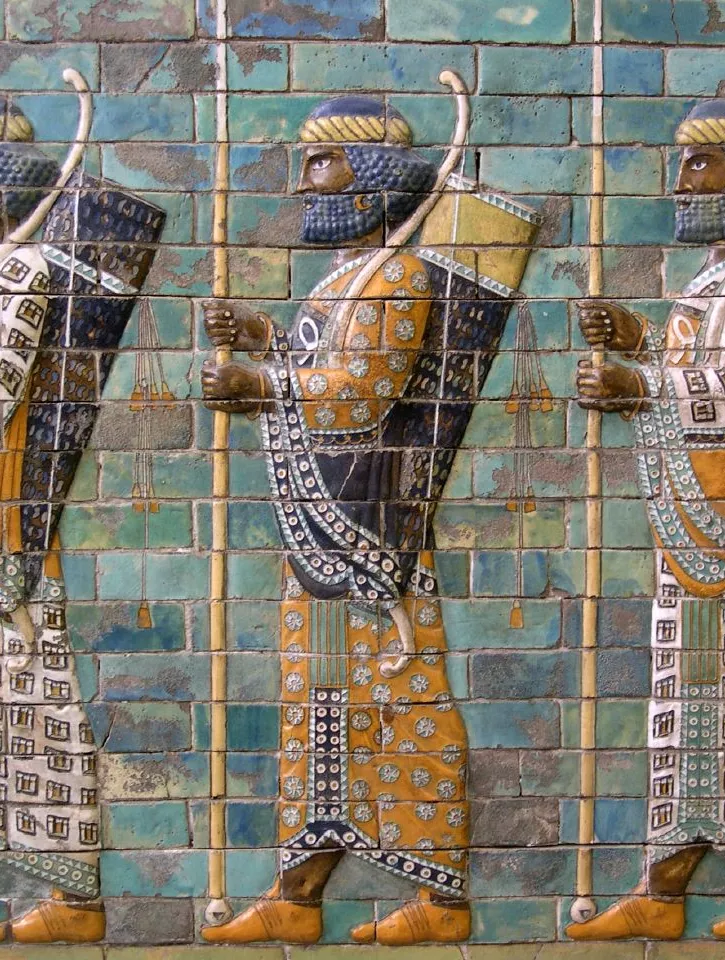Archaeology Graduate Students Host Professor Elspeth Dusinberre, Persian Empire Scholar, for 40th Annual C. Densmore Curtis Lecture

On Oct. 6 and 7, graduate students from the Department of Classical and Near Eastern Archaeology hosted the department’s annual C. Densmore Curtis Memorial Lecture, marking the 40th anniversary of the tradition. This year’s organizing committee, graduate students Jessica Goodman, Sarah Luckey, and Ashley Mason, brought Elspeth Dusinberre (Professor of Classics; University of Colorado, Boulder), renowned scholar of the Achaemenid Persian Empire, to Bryn Mawr College as the guest of honor.
The C. Densmore Curtis event was established in 1977 so that the graduate students of the Department of Classical and Near Eastern Archaeology could invite a prominent scholar to the college for a lecture, graduate student seminar, and dinners in honor of the speaker. The speaker is selected through a vote by all graduate students within the Department of Classical and Near Eastern Archaeology, with speaker nominations rotating each year between specialists in Classical and Near Eastern Archaeology. This year’s event continued a tradition of bringing prominent speakers through the halls of the college. Past events have included renowned archaeologists Sir John Boardman, Ian Morris, Susan Alcock, Bernard Knapp, Amelie Kuhrt, and Dan Potts.
The C. Densmore Curtis Lecture is funded by an anonymous donation on behalf of C. Densmore Curtis, an archaeologist with an interest in a wide range of Classical and Near Eastern societies. Born in Augusta, Maine in 1875, C. Densmore Curtis completed his Ph.D. at Columbia University in 1908 completing his dissertation, “Roman Monumental Arches” which was published subsequently published by the American School of Classical Studies in Rome. He was an active field archaeologist, notably conducting field work as a member of the American Expedition for the Excavation of Cyrene, Tripoli. He was also a Fellow, Lecturer, and Professor of Archaeology at the American Academy in Rome as well as Editor of the Academy Publications. C. Densmore Curtis passed away in 1925 at the young age of 49.
This year’s 40th celebration of the life and career of C. Densmore Curtis was a tour de force bridging the gap between the Classical and Near Eastern worlds. Professor Dusinberre’s Oct. 6 public lecture, “Power and the Ideal in the Ancient Persian Empire,” was a riveting elaboration of her ongoing work on cultural interactivity in the Achaemenid Persian Empire (550-323 BCE), especially Achaemenid Anatolia. Professor Dusinberre shed light on the remarkable interregional complexity of drinking vessels in use under the competing powers of Greek and Persian spheres of influence within Anatolia. She also drew attention to the significance of the Achaemenid “tulip bowl,” a type of drinking vessel for wine consumption ubiquitous in Achaemenid period sites across the Near East and Central Asia, as well as on the famous Apadana Reliefs of Persepolis, Iran. The drinking bowl was implicated in the politics of the era as an empire-wide marker of participation within a wider imperial system.
On Oct. 7, the graduate students invited Professor Dusinberre to lead a three-hour seminar discussion related to her current research at Gordion. Gordion was the ancient capital of Phyrgia in Central Anatolia, one of the most significant Late Bronze and Iron Age sites in the Near Eastern world, noteworthy for remarkable remains of an Iron Age city, fabulously furnished tumuli, the mythical king Midas, and site where the Macedonian king Alexander the Great cut the famed “Gordion Knot” - prophesying his claim to lordship over Asia. Professor Dusinberre invited the students to comment upon the evolution of Gordion’s funerary landscape of 35 known Phrygian tombs, highlighting changes in funerary practice into the Achaemenid Period.
The wildly successful weekend of events was capped by a lively dinner in Bryn Mawr’s town center. Hosted by Jessica Goodman, Sarah Luckey, and Ashley Mason, Professor Dusinberre was joined by graduate students and faculty of the Department of Classics and Near Eastern Archaeology as a token of appreciation for her visit to the college.